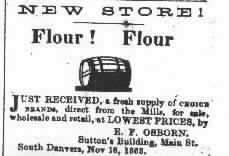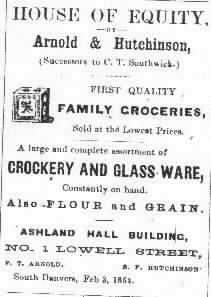
Fig. 15. 1 Advertisement

Fig. 15. 2 Advertisement
About
the South Danvers Wizard
Overview:
Jan.- July 1864
About
South Danvers (Peabody), Massachusetts
|
South Danvers Wizard, 1/6/1864,
p. 2/1
LARGE HOG - “The provision store of Fairfield & Rayner is
at present a great ‘curiosity shop’. They have there the most beautiful
specimen of swine’s flesh that we ever set eyes on. This fine looking
hog weighs when dressed 717 pounds, measuring from tip to tail, nearly
seven feet. He is in good proportion and his fat well distributed.
This fine fellow was only 18 months old when came to the knife. It
is not often that we can look upon such a handsome specimen of full-grown
pork, and it is well worth a while to visit him before he is eat up.
He was raised by Mr. Joseph Towne of Danvers.
They have another curiosity, in the shape
of a mammoth side of beef weighing 700 pounds! This is part
of the prize ox which drew the first premium at the late Agricultural Fair
at Andover. He was raised by Charles P. Preston, Esq. of Danvers,
and gives good evidence of its bringing up. He must have weighed
on the hoof, over 2000 pounds. He makes splendid looking beef and
every one who sees it, is anxious for a steak or a roaster.”
South Danvers Wizard, 2/17/1864, p. 2/7
AN OLD BARREL owned by Brown, Samuel under People
& Places B.
South Danvers Wizard, 4/13/1864, p. 2/6
BUTTER PLEDGE [Editorial] – “It is proposed by some philanthropic individuals
to circulate a pledge among the heads of families in this community, whereby
they agree to abstain from the use of butter altogether, until it
comes down to a fair price. We hope the matter will be thoroughly
done, as such a course would do more to bring the speculators to a realizing
sense of their wickedness, than any other method. Pass around the
butter pledges in every town and city, and it won’t be long ere butter
will be cheaper. This fame of picking away the earnings of the working
classes has been played full long enough, by a non-producing class of harpies.
Now let the people put their veto upon it in such a manner as will learn
these speculators a lesson which will not soon be forgotten.” Reprinted
from the Cape Ann Advertiser.
South Danvers Wizard, 5/4/1864, p. 2/5
BUTTER AND SPECULATIONS [Editorial]– “The high price of butter, which
places it beyond the reach of poor families, is caused, says the Banner
of Light, by a ring of speculators who have been shipping vast quantities
to Europe to pay for imported gewgaws, until the stock is nearly exhausted.
Here is a specimen of the rich trampling upon the rights of the poor in
one article of food alone, which should open the eyes of the working men
everywhere and induce them to form associations for their own mutual protection
against such abuses. If they do not move speedily in this matter,
nearly everything they eat, drink and wear will go into speculators’ hands
and be by them peddled out at fabulous prices.”
South Danvers Wizard, 6/1/1864, p. 2/7
NATIVE WINES – “Mr. L. G. Smith, a resident of this town, is quite
an adept in the business of wine making. He manufactures quite a
number of different varieties, including blackberry, current, elderberry,
and this pure juice of grape. They are all made of the very articles
from which they are named, and consequently are free from all ‘villainous’
compounds. His elderberry wines, particularly, are well spoken of
and physicians recommend them as an invaluable article for weakness and
disability. They are for sale at the fruit store of Mr. R. S. Flint’s
in this town and at Chamberlain’s Apothecary Store, Salem.”
South Danvers Wizard, 6/8/1864, p. 2/5
ALEWIVES – “Alewives have come. – They are caught and carried off by
the cart load at Lynn and Ipswich. We heard of a boy taking at the
last named place $60 worth in one day. By the way, this reminds us
of what some in our town may not know. We refer to the fact that
formerly the alewife fishery was regarded as one of the staples of our
material resources. Formerly, say about twenty years ago, our brooks
every spring were choked full of these very palatable fish. They
used to pass up to Spring and Brown’s ponds to spawn, and return with their
young in the Fall.
We have seen them so thick in Tapley’s Brook,
where it crosses Washington Street, that they could be scooped out by a
bushel basket full! ‘Boxes’ used to be arranged around the dams at
Wallis’ Pond and Frye’s Pond, through which the fish would work their way
up.
All this is now over: the use of the water
increased by tanning and currying business has made it poisonous to the
fish, and they have abandoned the town. The ‘boxes’ too, have become
entirely obliterated, and the Fish Committee, alias the ‘Alewife Man’,
lives only in tradition.” |

